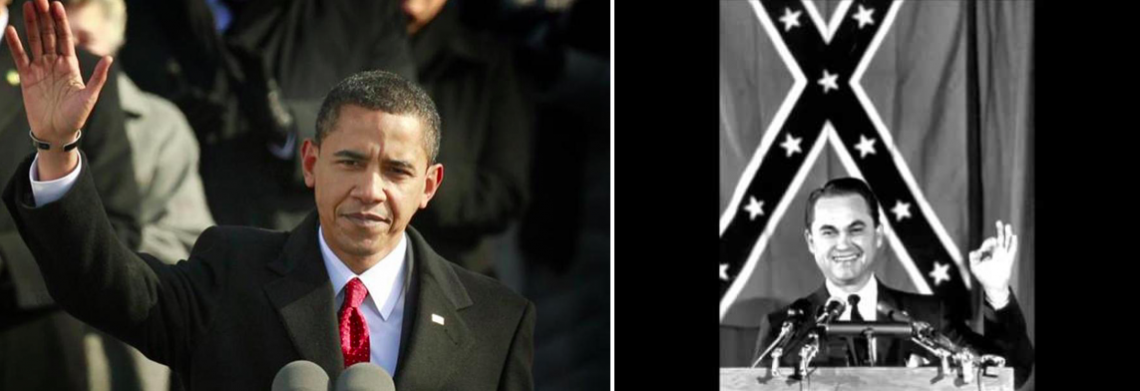Fifty years ago today (January 14, 1963), George Wallace, stood on the steps of the Alabama State Capital and delivered his 1963 inaugural speech as the state’s 45th governor. His inaugural speech was a defiant challenge against the attempts of the federal government and the U.S. Supreme court to enforce laws prohibiting segregation in Alabama’s public schools and other institutions.
As I look forward to Barack Obama’s second inaugural speech, which will take place exactly one week from today, I can’t help but think how far we have come as a nation from Wallace’s famous line, “In the name of the greatest people that have ever trod this earth, I draw the line in the dust and toss the gauntlet before the feet of tyranny and I say: segregation now, segregation tomorrow, segregation forever.”
Not only could Governor Wallace have never imagined Barack Obama as President of the United States, most Americans then (and many Americans only five years ago) could have never imagined it.
As I read the transcript of Wallace’s inaugural speech, I was amazed at the number of times he used the word, “faith,” bemoaning the government’s destruction of faith in God. At one point in his speech, he declared,
We have placed this sign, “In God We Trust,” upon our State Capitol on this Inauguration Day as physical evidence of determination to renew the faith of our fathers and to practice the free heritage they bequeathed to us. We do this with the clear and solemn knowledge that such physical evidence is evidently a direct violation of the logic of that Supreme Court in Washington D.C., and if they or their spokesmen in this state wish to term this defiance . . . I say. . . then let them make the most of it.
This nation was never meant to be a unit of one . . . but a united of the many. . . that is the exact reason our freedom loving forefathers established the states, so as to divide the rights and powers among the states, insuring that no central power could gain master government control.
In united effort we were meant to live under this government . . . whether Baptist, Methodist, Presbyterian, Church of Christ, or whatever one’s denomination or religious belief . . . each respecting the others right to a separate denomination . . . And so it was meant in our political lives . . . whether Republican, Democrat, Prohibition, or whatever political party . . . each striving from his separate political station . . . respecting the rights of others to be separate and work from within their political framework . . .
And so it was meant in our racial lives . . . each race, within its own framework has the freedom to teach . . to instruct . . to develop . . to ask for and receive deserved help from others of separate racial stations. This is the great freedom of our American founding fathers . . . but if we amalgamate into the one unit as advocated by the communist philosophers . . then the enrichment of our lives . . . the freedom for our development . . . is gone forever. We become, therefore, a mongrel unit of one under a single all powerful government . . . and we stand for everything . . . and for nothing.
Fifty years later, President Obama picks up the theme of faith in his second inaugural speech, “Faith in America’s Future.” Not only will Obama’s inaugural speech contrast and mark the 50th anniversary of Wallace’s inaugural speech, it will also mark the 150th anniversary of the Emancipation Proclamation.
Not only has America come a long way as a nation, all of us have come a long way as people. The American public that President Obama will address next week represents an American public where not only one or two groups of people have changed, but an American public where all of us have changed.
My children have no idea what segregation is, and for that I am grateful. While we are still not yet a “perfect union,” I believe we are “more perfect” than we were 150, 50, or even 5 years ago.
If the past is any indicator, we have reason to have “Faith in America’s Future.” Yes, we do still have a long way to go, but as we work together to move forward, let us not get caught up in simply demanding change, let us be open to being the change that America and the rest of the world needs.





Leave a Comment